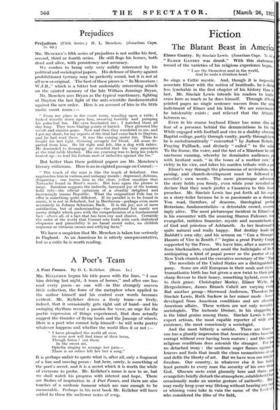Prejudices
Mn. MENCREN'S fifth series of prejudices is not unlike his first, second, third or fourth series. He still flogs his horses, both
dead and alive, with persistency and accuracy.
We confess to being only very mildly interested by his political and sociological papers. His defence of liberty against prohibitionist tyrrany may be perfectly sound, but it is not at all new or original. The best of these pieces is " In Memoriam : W.J.B.," which is a bitter but undeniably interesting- attack on the sainted memory of the late William Jennings Bryan, Mr. Mencken sees Bryan as the typical reactionary, fighting at Dayton the last fight of the anti-scientific fundamentalist against the new order. Here is an account of him in the little rustic court room :-
" From my place in the court room, standing upon a table, I looked directly down upon him, sweating horribly and pumping . his palm-leaf fan. His eyes fascinated me; watched them all day long. They were blazing points of hatred. They glittered like occult and sinister gems. Now and then they wandered to me, and I got my share, for my reports of the trial had come back to Dayton, and he had read them. It was like coming under fire. Thus he fought his last fight, thirsting savagely for blood. All sense de- parted from him. He bit right and left, like a dog with rabies. He descended to demagogy so dreadful that his very associates at the trial table blushed. His one yearning was to keep his yokels heated up—to lead his forlorn mob of imbeciles against the foe."
But better than these political papers are Mr. Mencken's literary criticisms. Here is an in-sighted passage on Conrad :—
" The touch of the man is like the touch of Schubert. One approaches him in various and unhappy moods : depressed; dubious, despairing ; one leaves him in the clear, yellow sunshine that Nietzsche found in Bizet's music. But here again the phrase is inept. Sunshine suggests the imbecile, barnyard joy of the human kohl rabi—the official optimism of a steadily delighted and increasingly insane Republic. What the enigmatical Pole has to offer is something quite different. If its parallel is to be found in music, it is not in Schubert, but in Beethoven—perhaps even more accurately in Johann Sebastian Bach. It is the joy, not of mere satisfaction, but of understanding—the profound but surely not merry delight which goes with the comprehension of a fundamental fact—above all, of a fact that has been coy and elusive. Certainly the order of the world that Conrad sets forth with such diabolical _eloquence and plausibility is no banal moral order, no childish sequence or virtuous causes and edifying facts."
We have a suspicion that Mr. Mencken is taken too seriously in England. As an American he is utterly unrepresentative, but as a critic he is worth reading.






















































 Previous page
Previous page